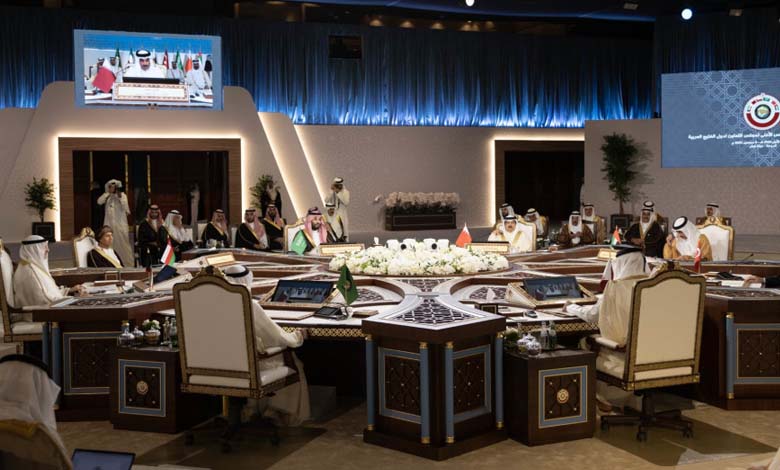Gulf Cooperation Renews Commitment to Supporting Morocco’s Territorial Sovereignty and Unity
The Cooperation Council emphasizes the importance of intensifying efforts to implement joint action plans with Morocco within the framework of the strategic partnership between the two sides.

The Gulf Cooperation Council reaffirms its commitment to its positions and decisions regarding the preservation of the security and stability of the Kingdom of Morocco, support for Moroccan Sahara, and backing for the autonomy initiative within Morocco’s sovereignty and territorial integrity. This stance reinforces Rabat’s diplomatic efforts regarding the realism of its initiative and once again emphasizes the Gulf states’ steadfast position on the Sahara issue.
This position came in a statement on the Council’s website following a meeting of the foreign ministers of the six member states: Saudi Arabia, the UAE, Kuwait, Oman, Qatar, and Bahrain. The meeting, hosted by Saudi Arabia, discussed regional and international developments in the presence of Moroccan Foreign Minister Nasser Bourita.
The statement emphasizes the importance of intensifying efforts to implement the joint action plans agreed upon within the framework of the strategic partnership between the two sides, welcoming Morocco’s candidacy for membership in the UN Security Council for the term 2028-2029.
Jassim Mohammed Al-Bedaiwi, the Secretary-General of the Gulf Cooperation Council, stressed in his speech during the meeting with the Moroccan Foreign Minister that the convening of the ministerial council comes as a reinforcement of the distinguished historical fraternal relations between them and support for the existing strategic partnership between the two sides in various fields.
He reiterated the Council’s Supreme Council’s conclusion at its recent meeting in Doha in December 2023, which emphasized the importance of the special strategic partnership between the Gulf Cooperation Council and the sisterly Kingdom of Morocco, the implementation of the joint action plan, and its firm supportive positions for Moroccan Sahara, maintaining the security and stability of the Kingdom of Morocco and its territorial integrity, praising Security Council Resolution 2703 issued on October 30, 2023, regarding the Moroccan Sahara.
He stressed that the ministerial meeting is another important step reaffirming the determination to face the challenges facing the region, expressing the participants’ eagerness to continue strengthening the foundations of the strategic partnership towards a comprehensive, multidimensional, and integrative framework, reflecting the depth, strength, and bonds of brotherhood between the Gulf Cooperation Council and the Kingdom of Morocco.
The renewal of support comes at a time when the autonomy initiative under Moroccan sovereignty is gaining momentum, with international acknowledgments that this initiative is the only basis for resolving the manufactured conflict. This support also reflects alignment in positions and visions with the approach of the Moroccan monarch King Mohammed VI to resolve the conflict in the Sahara according to the proposal of autonomy under Moroccan sovereignty.
The renewal of support reflects Gulf commitment to standing with Morocco in defending its territorial sovereignty amidst significant enhancement in relations in various aspects and fields.
This is not the first time officials and leaders in the Gulf Cooperation Council countries have announced their support for Moroccan Sahara. Gulf summits have repeatedly expressed their support for the territorial unity of the Kingdom of Morocco and affirmed the strategic relationship with Morocco.
The relationship between the two parties has gained significant momentum since King Mohammed VI ascended the throne following the death of his father, King Hassan II, and worked to elevate it to the level of a comprehensive strategic partnership.
In recent years, the Council has praised UN decisions supporting the Moroccan Sahara, in line with the vision of the Moroccan monarch for resolving the manufactured conflict.
In 2016, Gulf leaders supported Morocco in its dispute with the United Nations during the tenure of its late Secretary-General Ban Ki-moon, who at the time showed bias towards the separatist Polisario Front and departed from the principle of neutrality required by international treaties, norms, and UN charters and laws. Gulf states, especially the UAE and Bahrain, hastened to recognize the Moroccan Sahara and opened consulates in the city of Laayoune.
The Saudi Royal Diwan recently issued a decision calling for a ban on using the term “Western Sahara” or disseminating a fragmented map of the Kingdom of Morocco in all institutions, educational centers, government agencies, and ministries.
The decision emphasized the “necessity for all parties to refrain from using this term or the map of Morocco without its Sahara.”
Moroccan-Gulf relations are exemplary and a model to be followed in the Arab world, especially concerning economic partnerships as well as military cooperation and positions on some important issues in the Arab and international arenas, which has provided substantial support for Moroccan Sahara. In return, Morocco has taken supportive positions for the Gulf and its security, particularly in the face of destabilizing Iranian activities regionally and internationally. Rabat has also expressed support for Gulf reconciliation efforts, which have laid the groundwork for a new phase of solidarity and cooperation, further focusing on supporting stability and sustainable development. Moroccan-Gulf relations are a safety valve in the region, whether in achieving stability, combating terrorism, or promoting sustainable development.












